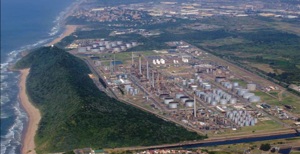South Africa's largest oil refinery operating, no strike impact

(Reuters) South Africa's largest oil refinery, jointly operated by Shell and BP, has not shut down due to a workers' strike over wages, a spokeswoman said on Thursday, contradicting an earlier union claim.
A senior union official had said the refinery, situated in the east coast Durban port and capable of refining 190 Mbpd, had come to a "standstill" on the first day of an indefinite strike by the Chemical, Energy, Paper, Printing, Wood and Allied Workers union (CEPPWAWU).
"The plant has not stopped production and we have measures in place to ensure continued safe operation during the national CEPPWAWU strike," spokeswoman Cindy Govender said.
Workers belonging to CEPPWAWU had issued a notice to strike in the petrochemical sector, seeking a 9% wage hike from employers offering less.
Work was unaffected at other major refineries operated by Chevron, Total, South African petrochemical firm Sasol, and national oil firm PetroSA.
"Operations continue as normal and there is no impact on production," Sasol spokesman Alex Anderson said as firms moved to mitigate any potential fuel shortages in Africa's most industrialized economy and a net importer of refined petroleum products.
"While nothing can be guaranteed, we will do as much as reasonably possible to ensure the continued supply of fuel products to our customers," Chevron spokeswoman Suzanne Pullinger said.
The National Petroleum Employer's Association has said a stagnating economy at home and weak global oil prices meant they could only offer a 7% raise this year, and an April CPI inflation plus 1.5% the following year.
Higher-than-inflation wage increases, which are being sought this year in negotiations in the mining, petroleum and manufacturing sectors, have been flagged by policymakers as a danger to an already weak economy.
Reporting by Wendell Roelf; Editing by James Macharia and Mark Potter






Comments